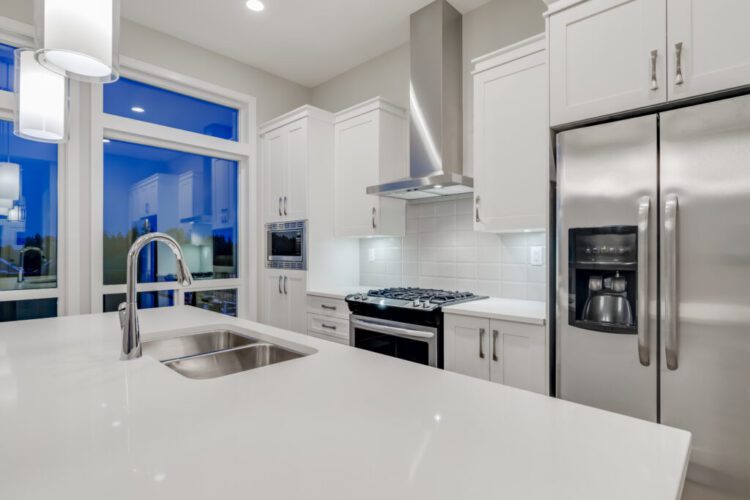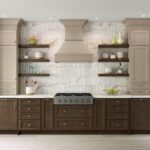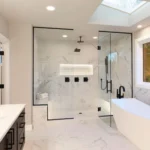Table of Contents
ToggleDesign Inspiration for Marble Kitchen Countertops
Marble countertops can add a touch of elegance and sophistication to any kitchen. With so many different types of marble and design options, it can be overwhelming to choose the perfect design for your kitchen countertops.
Choosing the right color is one of the crucial steps in designing your marble countertop. White marble is classic and timeless, but it can also stain easily. Gray and black marble will hide stains and imperfections better and can add contrast and depth to your kitchen design.
Another design element to consider is the veining in the marble. Some homeowners prefer a subtle veining to give a more minimalist look, while others prefer strong and bold veining to make a statement. It all comes down to personal preference and the overall design of your kitchen.
If you’re looking for a more dramatic look, consider using marble with a waterfall edge. This creates a sleek and polished look that can elevate the overall design of your kitchen.
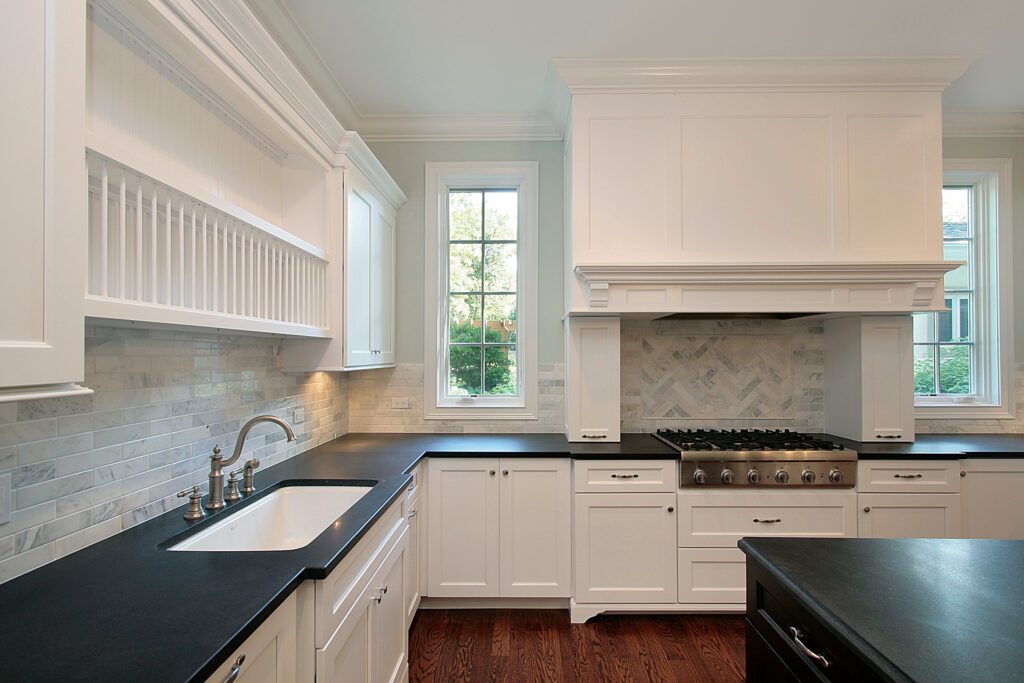
When it comes to maintaining your marble countertops, it’s important to regularly clean and seal them. This will help prevent stains and keep your countertops looking like new for years to come.
In conclusion, marble kitchen countertops can transform any kitchen into a luxurious and elegant space. With careful consideration of design elements such as color, veining, and edge style, you can create the perfect look for your home. And with proper maintenance, your marble countertops will continue to impress for years to come.
Maximizing the Functionality of Marble Kitchen Countertops
Marble countertops have been a popular choice for kitchens for centuries due to their beauty and durability. However, if not properly cared for and maintained, even the most luxurious marble can become dull and damaged. Follow these tips to ensure maximum functionality and longevity of your marble kitchen countertops.
1. Seal the marble regularly: Marble is porous and can easily absorb spills or stains. To protect your marble from damage, apply a penetrating sealer at least once a year or as recommended by the manufacturer.
2. Clean spills immediately: Marble is susceptible to etching and staining from acidic substances like wine, juice, and vinegar. To prevent this, clean up any spills immediately to avoid permanent damage.
3. Use a cutting board: Although marble is a durable material, it can still scratch and chip from sharp knives. Use a cutting board when preparing food to prevent damage to the surface.
4. Avoid harsh chemicals: Marble is a natural material and can be damaged by harsh chemicals like bleach and ammonia. Instead, use a mild cleaner specifically designed for marble countertops.
5. Protect from heat: While marble is heat-resistant, it can still be damaged by extreme heat. To avoid this, use trivets or hot pads under hot pots and pans to protect the surface.
By following these simple tips, you can ensure that your marble kitchen countertops remain functional and beautiful for years to come.
Creating a Timeless Look with Marble Kitchen Countertops
Marble kitchen countertops have been a symbol of luxury and elegance for centuries. In fact, ancient civilizations used marble to decorate some of the world’s most impressive buildings.
If you want to create a timeless and sophisticated look in your kitchen, marble countertops are an excellent choice. Marble is a natural stone that comes in a wide variety of colors and patterns, which means you can find one that perfectly complements your kitchen’s décor.
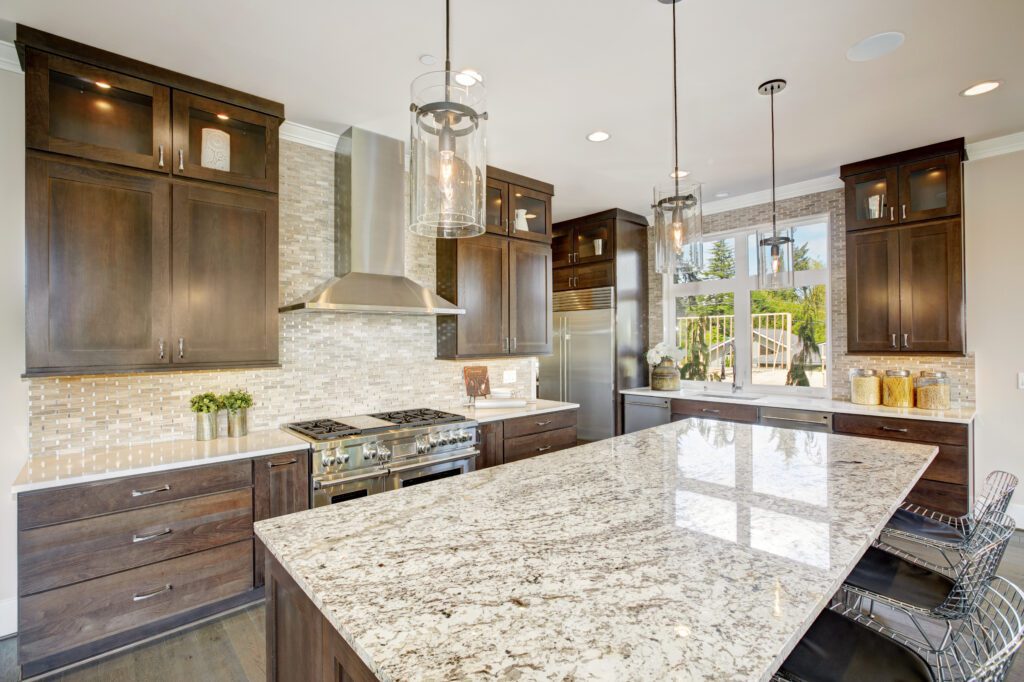
One of the most significant advantages of marble countertops is their durability. They are resistant to scratches, heat, and stains, making them an excellent choice for a highly trafficked area like the kitchen.
To ensure that your marble countertops last a long time, you should clean them regularly and avoid acidic or harsh cleaning agents. This will help preserve the natural shine and color of the marble.
One potential downside of marble countertops is that they can be relatively expensive. However, the price is worth it considering their long-lasting quality and beauty.
In conclusion, if you want to create a timeless and sophisticated look in your kitchen, marble countertops are an excellent choice. They are a symbol of luxury and elegance that will last for years to come. Plus, with proper care and maintenance, your marble countertops will look just as beautiful as the day they were installed.
Why Marble Kitchen Countertops are Worth the Investment
Marble countertops are a popular choice for homeowners when it comes to kitchen upgrades. While they may come with a higher price point compared to other countertop materials, such as laminate or granite, the investment is well worth it.
One of the biggest advantages of marble countertops is their durability. When properly cared for and maintained, they can last for decades without losing their beauty or functionality. Unlike other materials, marble does not scratch easily and can withstand high temperatures, making it an ideal choice for busy kitchens.
Another advantage of marble countertops is their versatility in design. With a variety of colors and patterns, marble can easily blend in with any kitchen style, from modern to traditional. Its natural veining and patterns also make each countertop unique, adding a touch of elegance and sophistication to any kitchen.
In addition to their durability and versatility, marble countertops also provide a hygienic surface for food preparation. Marble is a non-porous material, meaning it doesn’t allow bacteria or germs to penetrate its surface, making it easy to clean and sanitize. This is especially important for households with children or those who love to cook.
While it may require a bit of investment upfront, marble countertops are a great long-term investment for any homeowner. With their durability, versatility, and hygienic properties, they are a valuable addition to any kitchen.
Maintaining the Beauty of Your Marble Kitchen Countertops
Marble kitchen countertops are stunning and luxurious, but they require a bit of extra care to keep them looking their best. There are a few things you can do to keep your marble countertops looking beautiful for years to come.
First, it’s essential to clean up spills as soon as possible. Marble is porous, which means liquids can seep into the surface if left sitting for too long. Wipe up any spills immediately with a soft cloth and a gentle cleaner.
Secondly, avoid using harsh cleaners or abrasive materials that could scratch the surface. Marble is a softer stone than granite or quartz, so it’s important to use gentle cleaners and non-abrasive sponges when cleaning your countertops.
Thirdly, consider using a sealer on your marble countertops to help prevent stains and damage. A high-quality sealer will protect the surface of your marble and make cleaning up any spills much easier.
Finally, it’s always a good idea to use coasters and placemats under dishes and glasses to prevent scratches and stains from forming on your marble countertops.
In conclusion, with a little extra care and attention, you can keep your marble kitchen countertops looking as beautiful as the day they were installed. By following these simple tips, you can ensure that your investment in marble countertops will continue to pay off for years to come.
Frequently Asked Questions about Marble Kitchen Countertops
Marble kitchen countertops are a popular choice for many homeowners due to their elegance and durability. However, before making a purchase, it’s important to have all the facts and clear up any possible misconceptions. Here are a few of the most frequently asked questions about marble kitchen countertops.
1) What is Marble?
Marble is a natural stone that comes in a variety of colors and patterns. It’s formed from limestone that has been exposed to high pressure and heat, resulting in a solid and strong stone that’s ideal for countertops.
2) Are Marble Countertops Stain-Resistant?
Marble countertops are porous and can stain easily. However, sealing the surface regularly can prevent any stains from permanent damage.
3) Can Marble Countertops Be Scratched?
Marble is a relatively soft stone and can scratch easily. Therefore, it’s essential to use a cutting board and avoid placing heavy or sharp objects directly on the surface to avoid any damage.
4) How Often Do Marble Countertops Require Maintenance?
Marble countertops require more maintenance than other materials. It’s essential to wipe the surface regularly with a soft cloth, avoid abrasive cleaners, and seal it every six months to one year to prevent any stains and damage.
5) Do Marble Countertops Add Value to a Home?
Marble kitchen countertops add elegance and sophistication to any kitchen and can increase a home’s value.
In conclusion, marble kitchen countertops are a classic and refined choice for any home. However, they require proper care and maintenance to ensure their longevity and beauty. By understanding these common queries and taking appropriate measures, homeowners can enjoy their marble countertops for years to come.
Comparing Marble Kitchen Countertops to Other Materials
Marble kitchen countertops have been a popular choice for decades. They have a timeless beauty that adds a touch of elegance and sophistication to any kitchen. But with so many countertop materials available on the market today, it can be difficult to determine if marble is the right choice for your kitchen.
When comparing marble to other materials such as granite, quartz, and solid surface, there are several factors to consider. One of the most important factors is durability. Marble is a relatively soft stone that can scratch and chip easily, making it a less durable option compared to granite or quartz. However, with proper care and maintenance, marble can last a lifetime.
Another factor to consider is stain resistance. Marble is a porous stone that can absorb liquids and stains, making it more prone to staining than granite or quartz. Sealing your marble countertops can help prevent stains, but it is important to clean up spills quickly to avoid any potential damage.
When it comes to aesthetics, marble is hard to beat. Its natural veining and coloration offer a unique and elegant look to any kitchen. Granite and quartz offer their own beauty, but they lack the distinctive character that marble brings to a space.
Finally, cost is a factor to consider when comparing marble to other materials. Marble can be a more expensive option compared to other countertop materials, but it is important to keep in mind that it is a long-lasting investment that can increase the value of your home.
Overall, when deciding on a countertop material for your kitchen, it is important to consider all factors including durability, stain resistance, aesthetics, and cost. While marble may not be the most durable or stain-resistant option, its timeless beauty makes it a popular choice among homeowners.
How to Choose the Right Marble for Your Kitchen Countertops
Marble countertops can add elegance and sophistication to any kitchen. However, choosing the right marble for your countertops can be challenging. With so many varieties of marble available, it can be difficult to determine which one is right for your kitchen.
The first step in selecting the right marble is to consider your kitchen’s color scheme and design. You want to select a marble that complements your kitchen’s existing colors and style. For instance, if your kitchen has a modern design, you may want to select a marble with clean lines and sharp edges.
Once you have determined your kitchen’s design, you will need to consider the variety of marbles available. Each marble comes with its own unique pattern and characteristics. Some marbles feature simple, uniform patterns, while others have more dramatic veining. You should choose a marble that reflects your personality and style.
Another important factor in choosing the right marble is to consider its durability. Marble is a soft, porous stone that can stain and scratch easily. It is best suited for kitchens that are not high traffic areas. If you have young children or frequently entertain guests in your kitchen, you may want to consider a more durable, stain-resistant material such as granite or quartz.
In addition to considering durability, you should also think about maintenance. Marble requires regular maintenance to keep it looking its best. You should seal your marble countertops annually and clean up spills immediately to prevent staining.
When choosing the right marble for your kitchen countertops, it is essential to work with a reputable supplier. A reputable supplier will provide you with high-quality marble that is properly sealed and installed. They will also be able to provide you with advice on maintenance and care.
In conclusion, selecting the right marble for your kitchen countertops requires careful consideration. You must consider your kitchen’s design, the variety of marbles available, durability, and maintenance. By keeping these factors in mind and working with a trusted supplier, you can select the perfect marble for your kitchen that you will enjoy for many years to come.
The Pros and Cons of Marble Kitchen Countertops: A Comprehensive Guide
Marble has been a popular material for kitchen countertops for many years. It exudes elegance and sophistication and adds value to any home. However, like any material, marble has its pros and cons. In this article, we’ll examine both sides of the debate to help you make an informed decision when selecting your next countertop material.
Pros:
1. Aesthetics: Marble has a timeless look that never goes out of style. It comes in many colors and patterns, ranging from pure white to black, with grey, beige, and green hues in between. The veining on each slab creates a unique and stunning artistic pattern.
2. Breathable: Marble is a natural stone that allows air to circulate. This quality makes it ideal for baking and cooking because it keeps the dough cool while you work.
3. Resale value: Marble is a high-end material that is synonymous with luxury. Having marble countertops in your home can increase your home’s value.
4. Heat resistant: Marble is heat-resistant and ideal for kitchen use. You can place hot pots and pans on the surface without worrying about damage.
Cons:
1. Porous: Marble is a porous stone that can quickly absorb liquid. It is advisable to seal your countertops regularly to keep them from staining.
2. Easily Scratched: Marble is one of the softest natural stones, making it susceptible to scratches and chips from knives, pots, and pans. Although it is heat-resistant, it is not scratch-resistant and requires regular maintenance.
3. Cost: Marble is one of the most expensive countertop materials, often costing more than other natural stones such as granite.
4. Maintenance: The high-end look of marble comes with high-end maintenance. Marble surfaces require regular sealing and polishing to maintain their appearance and performance.
In conclusion, marble countertops are an excellent choice for homeowners looking to add elegance and sophistication to their kitchens. However, they come with some maintenance, care, and cost requirements. If you are willing to put in the effort, you will have a beautiful and long-lasting countertop that will add value to your home.
Installation Guide for Marble Kitchen Countertops
Marble is one of the most popular materials for kitchen countertops due to its beauty and durability. However, installing marble can be a challenging task if you are not familiar with the process. In this installation guide, I will share with you step-by-step instructions on how to properly install marble kitchen countertops.
Step 1: Measure and Order the Marble
Before you start with the installation process, it is essential to measure the area where you want to install the marble countertop. Measure the length, width, and depth of the countertop and then add an extra inch to each measurement. This will ensure that you have enough marble to work with.
Once you have your measurements, you can order your marble slab from a reputable supplier. Make sure to choose a supplier that offers high-quality marble and can provide you with all the necessary information regarding the installation process.
Step 2: Prepare the Area
Before you start with the installation process, you need to prepare the area where you will install the marble countertop. Remove the old countertop and clean the area thoroughly. If there are any uneven surfaces, use a sander to level them.
Step 3: Install the Plywood Base
You will need to install a plywood base to support the marble countertop. Measure and cut the plywood to size, then attach the plywood base to the cabinets using screws. Make sure that the plywood is level before you proceed with the installation.
Step 4: Cut the Marble Slab
Once you have the plywood base in place, it is time to cut the marble slab to size. Use a wet saw to cut the marble slab to the exact dimensions of your countertop. Take your time and make sure that the cuts are precise.
Step 5: Install the Marble Slab
Before you install the marble slab, apply a thin layer of silicone adhesive to the plywood base. Then carefully place the marble slab on top of the plywood base. Make sure that the marble slab is level, and use shims to adjust any uneven areas.
Step 6: Seal the Marble
Finally, you need to seal your marble countertop to protect it against stains and spills. Apply a high-quality sealer to the marble surface and let it dry for two to three hours. Repeat the process twice to ensure that the marble is properly sealed.
In conclusion, installing a marble kitchen countertop requires precision and attention to detail. By following these six steps, you can ensure that your marble countertop looks beautiful and remains durable for years to come. If you have any doubts or concerns, don’t hesitate to contact a professional for assistance.
Discover the Timeless Beauty of Marble Kitchen Countertops for Your Home FAQ
| Question | Answer |
|---|---|
| What makes marble a popular choice for kitchen countertops? | Marble is prized for its luxurious and elegant appearance, as well as its durability and resistance to heat. It adds a timeless and classic look to any kitchen. |
| What are the different types of marble available for kitchen countertops? | There are several types of marble available, including Carrara, Calacatta, Statuario, and Arabescato. Each has its own unique vein patterns and colors, allowing for flexibility in design choices. |
| How do you care and maintain marble countertops? | Marble countertops should be sealed regularly to protect against stains and scratches. Wipe up spills immediately and use coasters for hot items. Avoid using acidic or abrasive cleaners that can damage the surface. |
| What are the cons of installing marble kitchen countertops? | Marble is susceptible to scratching and staining if not properly cared for. It is also a porous stone, which means that it can absorb liquids, causing discoloration and bacterial growth. Additionally, it is one of the more expensive countertop options. |
| Can marble kitchen countertops increase the value of a home? | Yes, marble can add value to a home due to its luxurious and high-end appeal. It is a desirable feature for many homebuyers and can make a property more attractive to potential buyers. |
